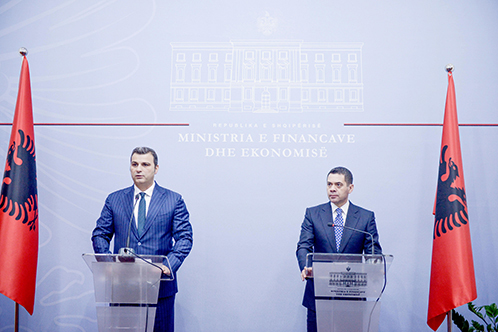BANK OF ALBANIA
PRESS RELEASE
Governor Sejko: Address at the joint press conference with the Minister of Finance and Economy
Publication date: 07.12.2017
Dear Minister Ahmetaj,
Dear media representatives,
It is with great pleasure that I present this concrete initiative of the Bank of Albania (BoA) in the framework of our efforts to promote the formalization of the economy. It is encouraging to see that a series of initiatives by other Albanian authorities are taken for the same purpose, to enhance the law enforcement and the use of financial channels. Experience has shown that complementary efforts of regulatory institutions lower the policies’ implementation costs and increase their likelihood for success.

Informal activity imposes open and hidden costs for the Albanian economy and the society. It damages the country’s public finances, increases the tax burden and distorts its effect on the economic agents, hampers competition and increases the costs of fair business activity, reduces business financing resources and curbs their normal development, and creates social problems that arise from lack or insufficient coverage of social and health insurance.
From the BoA’s point of view, as the monetary authority and as the supervisor and regulator of the banking sector, informal activity reduces the effectiveness of our stabilization policies and creates the premises for instability of one or more segments of the financial system.
Focusing on the latter issue, I would like to remind you that safeguarding and strengthening financial stability has been and remains a major objective of BoA’s work. As we have stated in our previous communications, the deterioration of the loan portfolios’ quality has been one of the biggest challenges we have been facing in recent years. This deterioration reflected the effect of many factors, but the high level of informality in the economy, undoubtedly, provided its contribution to this performance. More concretely, the lack of financial transparency, lack or problems with property titles and those encountered during the execution of collateral contributed to the increase of non-performing loans and were a barrier to our legal and regulatory measures, for their reduction.
In addition to the negative impact of informality on the loan performance and quality, it has also negatively affected the borrowers. Taking risks beyond the repayment capacities, not identified as a result of the lack of clarity regarding the financial statements, has also caused credit default, thus making/driving borrowers face with unpredictable situations.
For these reasons, the Bank of Albania has commended and has continuously supported the initiatives for increasing the formalization of the economy.
We have taken several measures to address informality, which have given their effects over the years. Enhancing transparency and lowering the costs of bank transactions, without affecting the operational independence of banks and their decision-making, has brought households and enterprises closer to the financial institutions.
The national plan for the reduction of non-performing loans established a regulatory criterion, as an important task for/to the Bank of Albania. Starting from 2018, lending activity should take into account only tax declarations. This is one of the key elements for addressing informality, also for the significant share of the banking activity in the domestic economy. The Bank of Albania has previously dealt with this phenomenon from a regulatory point of view, but only with large borrowers. The coordination of efforts with government bodies and appropriate actions taken in this regard have created the necessary space for taking this regulatory measure further to include a broader base of borrowers.
The Bank of Albania is confident that this measure will bring long-term benefits for all parties involved in the process.
- For the banking industry: crediting based on tax declarations facilitates significantly the lending process by putting banks on a common denominator in reading financial data. This eases the lending activity, providing banks with more clarity in the process of financial analysis and selection of borrowers, as well as exchanging information for common borrowers.
- For Albanian enterprises and households: this process promotes transparency, which will be translated into reduction of credit risk and, most importantly, lowering of financing cost. Also, by providing a level playing field, this process fosters competition and efficiency, which, ultimately, contributes to the overall economic development of the country.
- For the economy: this process increases the country's economic and financial stability and creates premises for a simpler tax system and a fairer distribution of the tax burden.
Thank You!

 Linkedin
Linkedin
 Twitter
Twitter
 Youtube
Youtube
 Facebook
Facebook
 Flickr
Flickr
 RSS
RSS
 Subscribe
Subscribe
 Feedback
Feedback